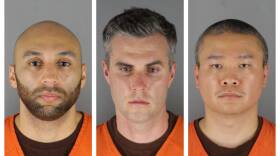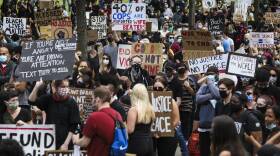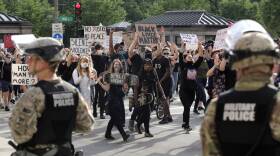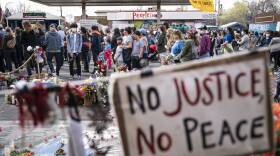EXPLORE MORE
BPR is on tape for the July 4th holiday. We'll be back live on Monday, July 7 with:
NAACP’s Michael Curry
Boston University journalism head Brian McGrory
Vulture podcast critic Nick Quah
July 8 - Ask the Mayor
July 9 - Ask the AG
Recent segments
-
Why Bay Windows And The South End News Are Being Put Up For Sale
Co-owner Sue O'Connell tells us about her time at both publications and why she's looking to sell. -
COVID Has Created 'New Customers' In The Cannabis Industry, Says Co-Owner Of Boston's First Recreational Dispensary
Pure Oasis is featured this week on BPR’s ongoing series about local businesses re-emerging from the pandemic. -
What Comes Next For The Other Officers At The Scene Of George Floyd's Arrest?
Former Suffolk County Sheriff Andrea Cabral said Derek Chauvin's conviction is a "far cry" from justice. -
'All Rev'd Up' Hosts Debate Justice And Racism In American Policing Following Chauvin Verdict
The co-hosts both agreed that Tuesday's guilty verdict was a step in the right direction for American policing. -
National Security Expert Defends Activation Of National Guard In Massachusetts, Reflects On Future Of Policing
Juliette Kayyem criticized the power of police unions and county sheriffs, as well as the sheer number of police departments. -
NAACP's Michael Curry Warns Of Backlash, Urges Action On Racial Justice In Wake Of Chauvin Conviction
What comes after the Chauvin conviction? Curry said sustained action is needed to prevent continued generational trauma.
Listen to previous shows
-

BPR Full Show: Asylum seekers and world record breakers
Today on Boston Public Radio: We opened the show with a call-in segment and heard from listeners about the migrants on Martha’s Vineyard moving to temporary housing on Cape Cod. Iván Espinoza-Madrigal discussed the relief efforts for the 50 migrants that landed in Martha’s Vineyard and calls for an investigation into the involvement of Florida’s Gov. Ron DeSantis. Iván Espinoza-Madrigal is the Executive Director of Lawyers for Civil Rights in Boston. Andy Borowitz detail the political players and events that inspired his new book, "Profiles in Ignorance: How America's Politicians Got Dumb and Dumber." Andy Borowitz is a New York Times best-selling author, comedian, and news satirist of The Borowitz Report for The New Yorker. Charlie Sennott discussed the international implications of the death of Queen Elizabeth II and the future of nuclear weapons in the war in Ukraine. Charlie Sennott is an analyst for GBH News and the editor, founder, and CEO of The GroundTruth Project. Brian McGrory talked about his new role as chair for the College of Communication journalism program at Boston University and stepping down from his tenure at The Boston Globe. For many years, Brian McGrory worked as a reporter to columnist to Metro editor since 2012 for The Boston Globe. Rev. Irene Monroe and Rev. Emmett G. Price III discussed the passing of Eric Jackson and his legacy as jazz host for GBH, along with the funeral of Queen Elizabeth II, and the migrants of Martha's Vineyard seeking asylum. Revs. Irene Monroe and Emmett G. Price III are co-hosts of the All Rev'd Up podcast on GBH. Henry Swenson shared his planting strategy to compete for the biggest pumpkin at the Topsfield Fair. Henry Swenson is a Guinness World Record holder for his 65-pound butternut squash. We closed the show with a call-in segment and heard from listeners about the conservative dating app ‘The Right Stuff’ and whether listeners would date outside their own political affiliations. -

BPR Full Show: Sept. 16, 2022
This episode of Boston Public Radio is from Friday September 16, 2022. Elle Simone Scott of America’s Test Kitchen shared tips on how to make the perfect food board for hosting. Joanne Chang talks about her latest book inspired by her baking journals, “Pastry Love: A Baker’s Journal of Favorite Recipes.” Billy Collins shares some of his poetry ahead of his June 16 appearance at 2Life Communities’ annual gala. Boston Globe sports reporter Dan Shaughnessy discussed his latest book on the Boston Celtics, “Wish It Lasted Forever: Life with the Larry Bird Celtics.” Chef Christopher Kimball previewed his latest cookbook “Vegetables,” sharing his favorite ways to bring vegetables to the center of the plate. Law professor Rosa Brooks discussed her new book, “Tangled Up In Blue: Policing The American City,” and described her experiences as a reserve police officer in Washington, D.C. Atlas Obscura co-founder Dylan Thuras told stories of strange food from around the world, including psychedelic honey, the anti-masturbatory origins of graham crackers and the great molasses flood in Boston in 1919. Author Susan Orlean previewed her latest book “On Animals.” -

BPR Full Show: Sept. 15, 2022
This is the podcast for BPR’s show on Thursday, September 15, 2022. We started the show with NBC Political Director and moderator of Meet The Press, Chuck Todd. We then turned to Eve Zuckoff, reporter for WCAI, who was on the ground in Martha’s Vineyard, reporting on the dozens of migrants sent to the island by Florida Governor Ron DeSantis. Andrea Cabral, former Massachusetts Secretary of Public Safety and Sheriff of Suffolk County. We wrapped the live portion of our show with incoming Boston Public Schools Superintendent Mary Skipper. The remainder of the show was on tape, featuring Boston Globe reporter Billy Baker on his book “We Need to Hang Out: A Memoir of Making Friends” and Harvard Business School’s Michael Norton on the importance of widening your circle of friends. -

BPR Full Show: The Friendship Show
Today on Boston Public Radio: We opened the show with a conversation with NPR legal affairs correspondent Nina Totenberg on her new book "Dinners with Ruth: A Memoir on the Power of Friendships." Then, we opened the lines to hear from listeners about making friends: at the office, in person and online. For the remainder of the show, we re-aired some of our favorite conversations, including: Charlie Warzel on his book “Out of Office,” coauthored with Anne Helen Peterson, reporter Spencer Buell and noise researcher Erica Walker, about health concerns over rising noise levels in the city, the New Yorker's Malcolm Gladwell about his book, “Talking to Strangers: What We Should Know About the People We Don’t Know," writer Lindy West about her book, “The Witches Are Coming." and Lizzie Post, great-great-granddaughter of etiquette expert Emily Post, about her book “Higher Etiquette: A Guide to the World of Cannabis, from Dispensaries to Dinner Parties.” -

BPR Full Show: Fall Blues & Bad Apples
Today on Boston Public Radio: We opened the show by talking with listeners about autumn, and the dread that comes with transitioning from summer to fall. Trenni Casey talked about the Patriots’ flop of an opening game against the Miami Dolphins and what the loss says about Patriots coach Bill Belichick’s ability, winners from this year’s U.S. open, plus new rules for Major League Baseball. Boston Mayor Michelle Wu returned for an hour of “Ask the Mayor,” discussing decision to challenge Boston’s 2020 census results, ongoing MBTA shutdowns and workaround shuttles, and her choice to vote for Suffolk County D.A. candidate Ricardo Arroyo in the September primaries. She also responded to questions from listeners. Michael Kirk discussed his latest “Frontline” documentary, “Lies, Politics & Democracy,” which delves into former President Trump’s relationship with the GOP and how Republicans enabled anti-democratic efforts after his 2020 election loss. John King weighed in on an August inflation report and discussed how it stands to impact voter’s views on the economy. He also spoke on a forthcoming Senate vote to protecting same-sex marriage, and other national headlines. We closed out the show by turning to listeners for their thoughts on growing acceptance of anti-democratic politicians in the U.S., off of Michael Kirk’s new film for “Frontline.”









